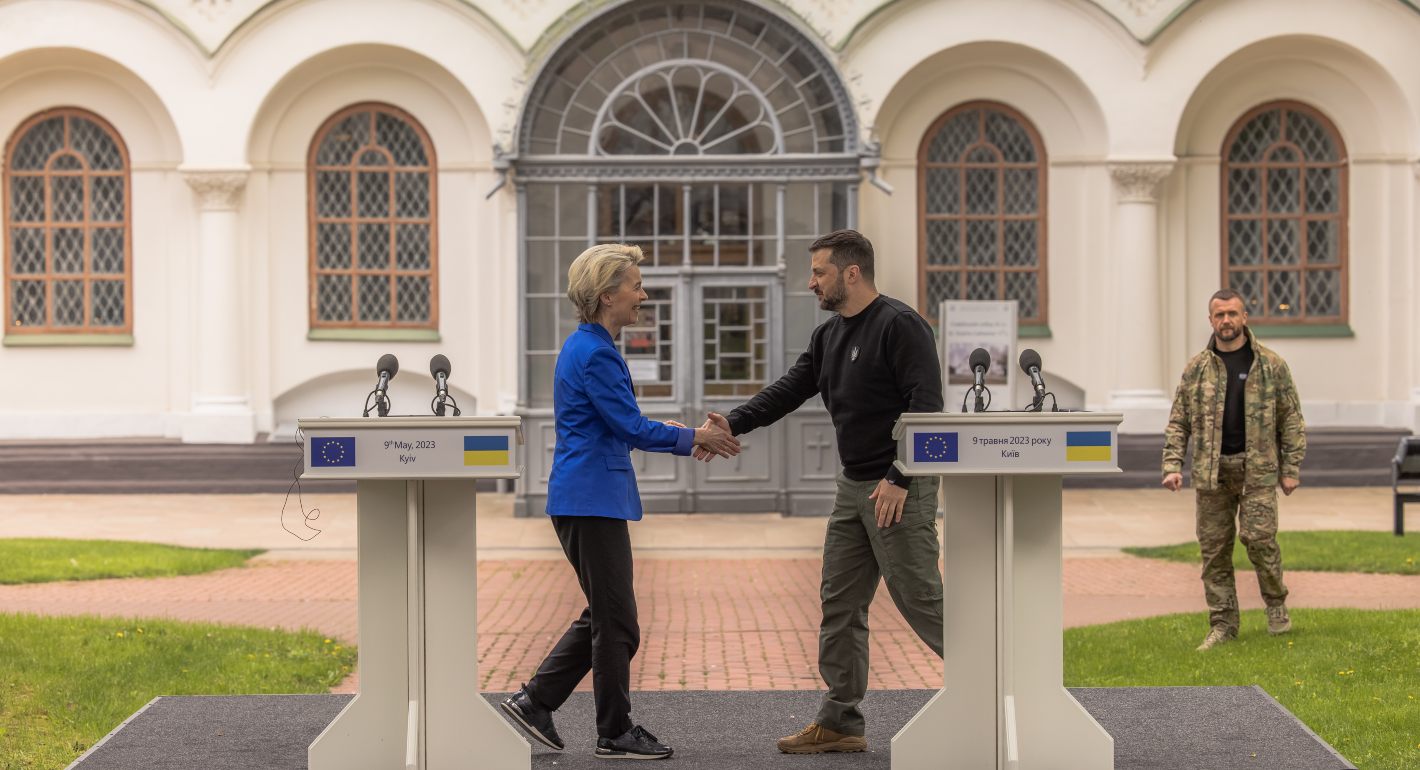In that context, analysts and EU policymakers should pause and ask why, when some 90 percent of Ukrainians want the country to join the union, 32 percent of them neither trust nor distrust it and 15 percent still do not trust the bloc. This is likely because some Ukrainians are critical of the EU as a steadfast ally, not least in the war with Russia. This should not come as a surprise, since the EU’s record on Ukraine has been complicated, and some Ukrainians might view the EU as not having done enough or acted early enough. For example, some EU member states’ reliance on Russian energy or some EU leaders’ personal relationships with Russian President Vladimir Putin today or in the past have dimmed Ukrainians’ trust in the EU and its capacity to act in a speedy and decisive manner.
Moreover, it may well be visible even to ordinary Ukrainian citizens that while the EU has opened accession negotiations with Ukraine, some of the EU’s previous blind spots persist. Notably, there are misconceptions that permeate public discussions and presentations by EU officials, not least about how pervasive corruption was in Ukraine before the all-out invasion or how strong and robust Ukrainian democracy is. It would be worthwhile for the EU to do more to acknowledge that Ukraine’s leaders and civil society have already achieved a great deal more in terms of agricultural reform, decentralization, and anticorruption than other Eastern European states had before entering formal accession negotiations. In Ukrainians’ view, they have fiercely demonstrated their democratic credentials. Any public sense among ordinary citizens in Ukraine that the EU might drag out the accession process using the amorphous and opaque language of “fundamentals” can weaken their trust.
Finally and certainly visible to ordinary Ukrainians, the cohesive and speedy delivery of financial, humanitarian, and military support to Ukraine has seen fractures and even severe delays since December 2023. These developments might also likely reduce Ukrainians’ trust in the EU and its institutional capacity. The EU needs to iron out or work around the internal institutional bottlenecks that impede or delay the timely delivery of key support to Ukraine. This is all the more important as the war is entering its most difficult phase and support from other major allies, such as the United States, is becoming unpredictable.
If these bottlenecks prove insurmountable, the EU must work to manage expectations, because the untimely or failed delivery of support can be used by adversaries of Ukraine and the EU in disinformation campaigns. A perception that the EU has not delivered on its promises may have an adverse effect on some Ukrainians who believe they have paid the ultimate price for Europe.
Democratic Values as a Central Driver
Nonetheless, factors that may lower Ukrainians’ trust in the EU from the outside do not temper their belief that they belong inside the union as full members. This is because for Ukrainians, the EU represents essential democratic values. Analysis of the survey data indicates that support for such values correlates strongly with a pro-EU sentiment. Identifying as a democrat increases one’s likelihood of supporting EU membership, an effect that remains robust across demographic and socioeconomic variables. This finding challenges the notion that economic factors or geopolitical considerations are the primary drivers of EU aspirations. Instead, it points to Ukrainians’ profound and principled alignment with the democratic ideals and governance model championed by the EU.
This trend underscores the need for the EU to reevaluate its approaches, particularly toward countries like Russia, and place democratic values at the forefront of its external relations and accession policies. In doing so, the EU has an opportunity to leverage its democratic appeal strategically by fostering closer ties with countries that share its commitment to democracy and the rule of law. The EU and its member states should recommit to these principles and ensure that the union remains a symbol of hope and a catalyst for democratic transformation beyond its borders.
Acknowledging the Appeal of Democracy
Although the three issues of wartime support, EU accession, and postwar reconstruction overlap considerably, there is an argument for the EU to decouple them. The technical practicalities, policy priorities, and coordination required to win the war are not the same as the policy progression needed for Ukraine’s EU accession and full reconstruction. In fact, it might be possible for Ukraine to align with most, if not nearly all, of the acquis—the body of EU law—required for accession before the country can secure a decisive victory against Russia and certainly before it can complete its postwar reconstruction.
By contrast, if the EU links these issues, such an approach might give citizens the impression that membership is being pushed back. Furthermore, Ukraine’s path to accession should not be tied to those of neighboring countries, for even in wartime Ukraine’s progress on key policy areas might be exceptional. The danger of falling short of expectations, or of not managing expectations correctly, can and will be exploited by both internal dissenters and external adversaries.
But perhaps most importantly, the EU’s approach toward its neighbors and broader policy frameworks must evolve to acknowledge the almost magnetic appeal of its democratic values. As Europe and the wider world increasingly embrace democratic ideals, with many citizens in neighboring countries aspiring for closer ties with the EU or even full membership, the response from autocratic regimes has been notably adversarial. These regimes perceive the democratic orientation and EU aspiration of their citizens as direct threats to their authoritarian grip on power.
This situation underscores the urgent need for the EU not only to recognize its democratic pull factor but also to leverage it strategically. Such an approach would solidify the EU’s role as a catalyst for change that can promote democratic governance in the face of autocracy and enhance the resilience of democratic institutions and values on a global scale.
Olga Onuch is professor (chair) of comparative and Ukrainian politics at the University of Manchester, United Kingdom.

